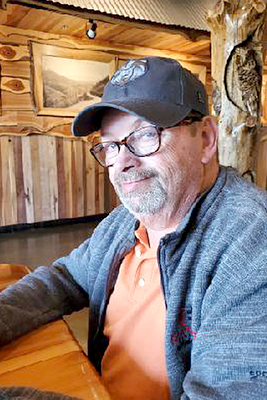Right Place, Right Time
Ten years ago, Gary Carpenter’s brother had a heart attack and Gary was encouraged to get checked out himself. The results were shocking.
 “I had a family history of heart issues, and I was experiencing some symptoms,” says Gary, of Richmond, Indiana. “I couldn’t walk very far without getting winded, and I had some shoulder pain.”
“I had a family history of heart issues, and I was experiencing some symptoms,” says Gary, of Richmond, Indiana. “I couldn’t walk very far without getting winded, and I had some shoulder pain.”
The heart scan showed that Gary had coronary artery disease, a condition that results when the arteries that feed the heart become narrowed or blocked. This occurs from a buildup of plaque, a waxy substance made of cholesterol and other materials. Coronary artery disease is the most common type of heart disease.
“I was clogged everywhere,” Gary says. “I was only 46. I couldn’t believe I had heart disease that was this advanced.”
Gary’s primary care doctor referred him to a local cardiology team in Indiana, where he was told that a multiple bypass surgery was his only option.
This procedure involves removing different blood vessels from other areas in the body and attaching these to the heart. The grafted blood vessels are used to create a detour around each blocked heart artery. This restores blood flow to the heart.
Recurring heart issues, and an emergency
After the bypass, Gary felt better for several years. But in 2019, he started having shoulder pain again and some chest pain. He went back to his local team and they put in a stent, a small tube device that’s placed in a coronary artery to help prevent it from becoming blocked again.
In the summer of 2021, Gary was on vacation in Howell, Michigan, when he started having severe chest pains.
“I told my wife that we needed to go to a hospital,” Gary said. “We went to a local hospital, but they weren’t able to treat me and sent me to a larger hospital in the area.”
After evaluating him, the staff told Gary that his best option was to go to Henry Ford Hospital in Detroit.
Two advanced procedures
Gary was rushed by ambulance to Henry Ford Hospital, where he met with Khaldoon Alaswad, M.D, who performed a diagnostic heart catheterization.
“When he got the results, he told me mine was a complicated case,” Gary says. “But he said that’s what he did, complicated cases.”
Dr. Alaswad and his team performed two advanced, minimally invasive procedures to unblock Gary’s heart.
The first is known as chronic total occlusion percutaneous coronary intervention (CTO PCI). Henry Ford is one of few to offer this bypass alternative, which uses catheters and tiny wires to drill through or around coronary artery blockages.
The second was brachytherapy, which uses radiation to help prevent recurrent blockage in a stent.
Brachytherapy is a new procedure that involves coordination between an interventional cardiologist and a radiation oncologist. First, the radiation oncologist determines the exact amount of radiation needed for the procedure and prepares this in a contained dose. Then, the interventional cardiologist uses a catheter to deliver this dose to the blocked or narrowed artery in the heart. The catheter and radioactive material are removed a few minutes later.
Back to enjoying life
“I had some immediate relief in my symptoms after the CTO PCI procedure,” Gary says. “A month later, I had the brachytherapy, and I felt even better after this. Before these procedures, I was taking 3 or 4 nitroglycerine a day for chest pain, and now I don’t take any.”
Gary has also been able to return to his passion: Cincinnati Bengals football.
“I’m a season ticket holder,” Gary says. “Before my treatment at Henry Ford, I had a hard time even walking in and out of the stadium. Now, I don’t have any restrictions, and I can’t believe how much better I feel. My family’s surprised with how well I did after my procedures.”
Gary has also made some lifestyle changes to help improve his overall wellness and heart health, including eating better and cutting out alcohol.
“I do periodic follow-ups with my own cardiologist here in Indiana,” Gary says. “But if I ever have to get another procedure, I’ll definitely travel to Detroit again and go to Henry Ford.”
.svg?iar=0&hash=F6049510E33E4E6D8196C26CCC0A64A4)

/hfh-logo-main--white.svg?iar=0&hash=ED491CBFADFB7670FAE94559C98D7798)